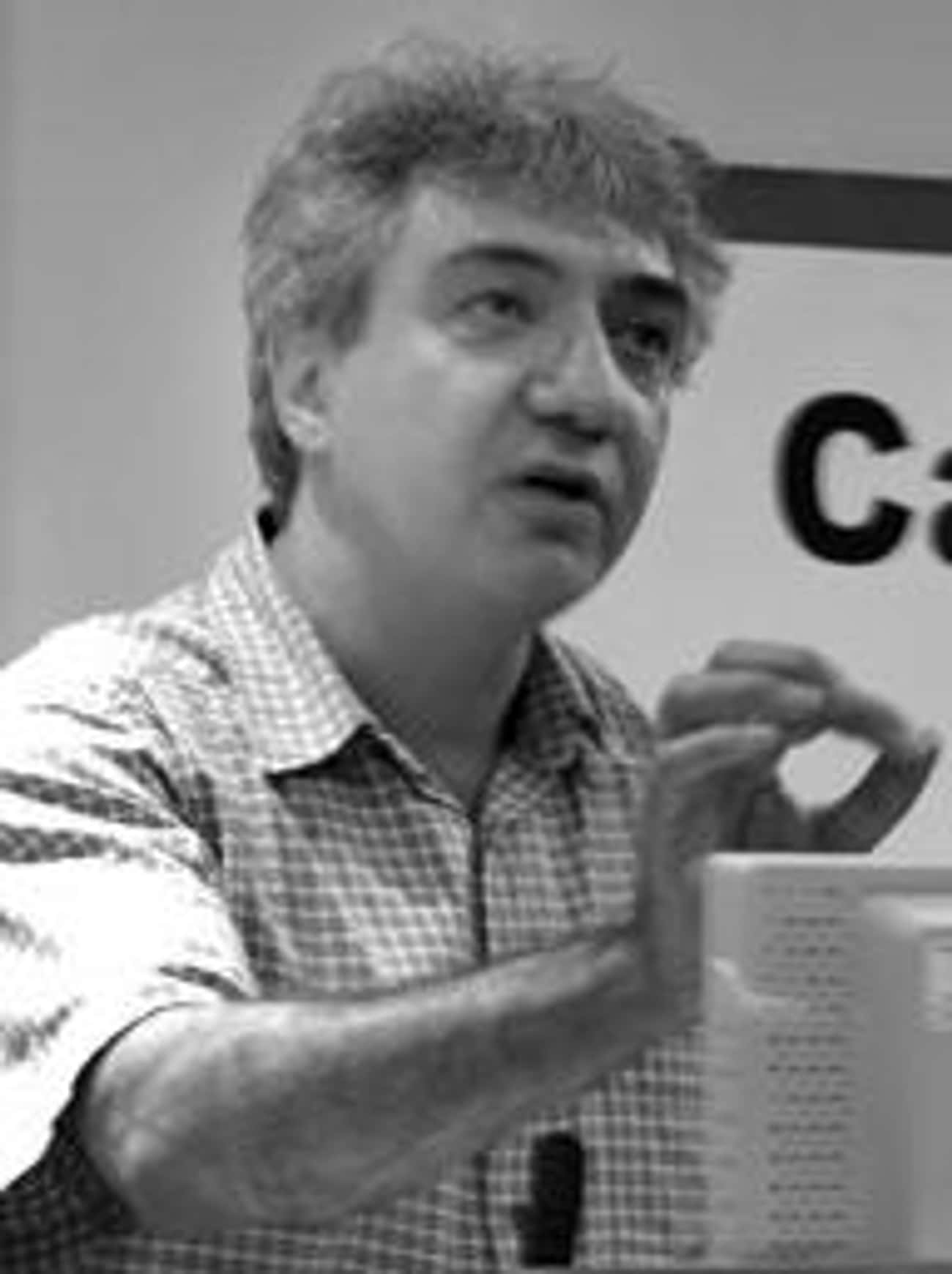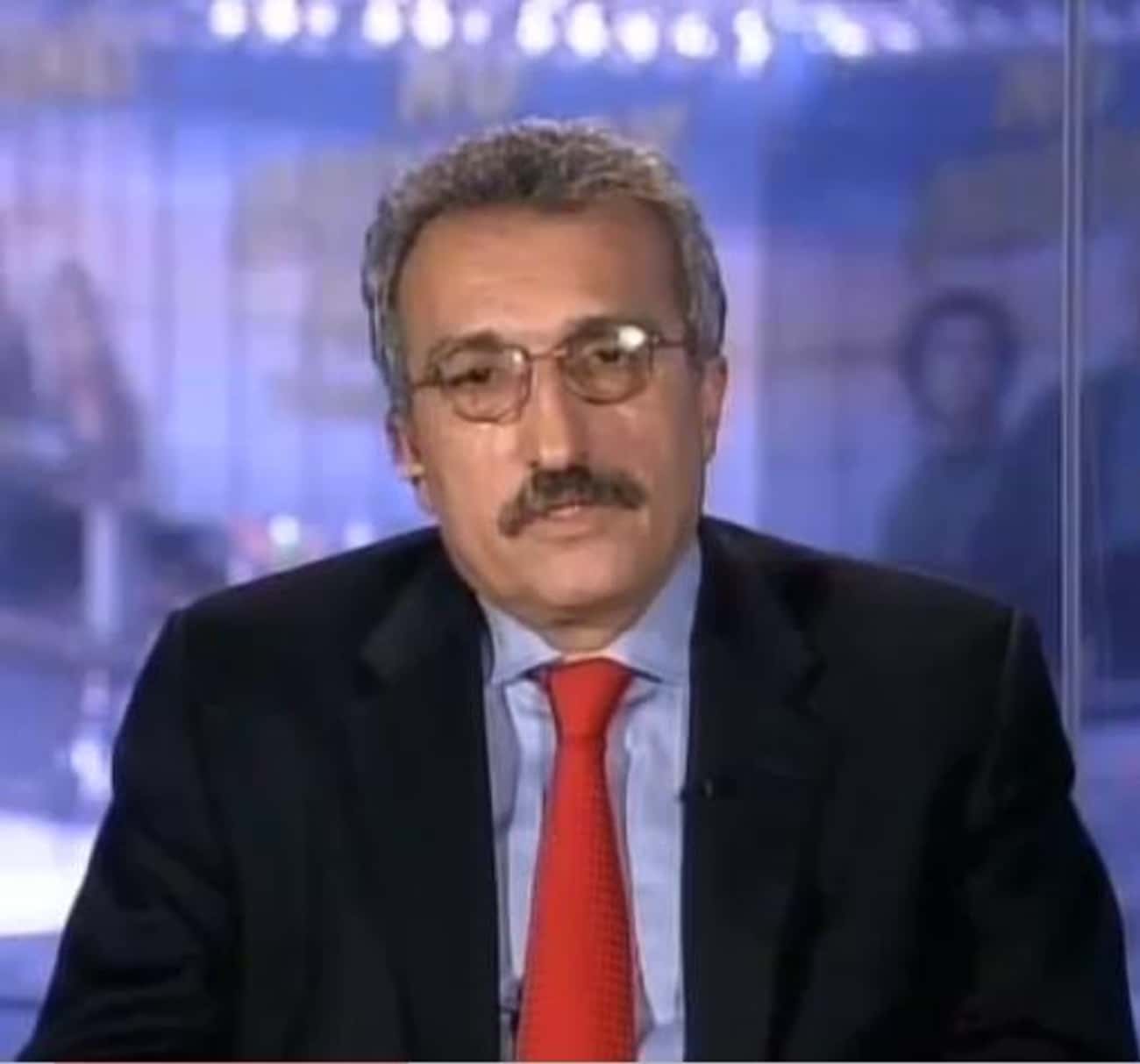Famous Professors from Iran
- Photo: Metaweb (FB) / Public domainAbbas Edalat (Persian: عباس عدالت) is a professor of computer science and mathematics at Imperial College of London and a political activist. In a 2018 letter to The Guardian, 129 experts in computer science, mathematics and machine learning described him as "a prominent academic, making fundamental contributions to mathematical logic and theoretical computer science" Edalat also founded SAF and CASMII, a campaign against sanctions and military intervention in Iran. Edalat has appeared on BBC News on numerous occasions.
- Photo: Metaweb (FB) / Public domainAbbas Malekzadeh Milani (Persian: عباس ملکزاده میلانی; born 1949) is an Iranian-American historian and author. Milani is a visiting professor of Political Science and the director of the Iranian Studies program at Stanford University. He is also a research fellow and co-director of the Iran Democracy Project at Stanford University's Hoover Institution. Milani has found evidence that Persian modernism dates back to more than 1,000 years ago.
- Afshin Ellian (born 27 February 1966 in Tehran, Iran) is an Iranian-Dutch professor of law, philosopher, poet, and critic of political Islam. He is an expert in international public law and philosophy of law.
- Photo: Metaweb (FB) / CC-BYAli Akbar Jalali, best known as Dr. Jalali, is an Iranian professor and author. He is most recognizable from a series of radio and television appearances in which he would promote the use of Internet and IT technology in Iran.
- Ali Massoud Ansari (Persian: علی مسعود انصاری, born 24 November 1967 in Rome) is the Professor in Modern History with reference to the Middle East at the University of St Andrews in Scotland, where he is also the founding director of the Institute for Iranian Studies.
- Ali Tajvidi (Persian: علی تجويدی; November 7, 1919 – March 15, 2006) was an Iranian musician, composer, violinist, songwriter, and music professor at the School of National Music and Tehran University. He composed more than 150 songs and discovered and produced for many Persian performers such as Delkash and Hayedeh. He was born in Tehran, where his father was active as a painter in the style of Kamal-ol-Molk. In his youth he took violin lessons for two years under Hossein Yahaghi (uncle of Parviz Yahaghi) and for many years was under the tutelage of Abol-Hassan Saba for the violin as well. also took Harmony lessons under Houshang Ostovar.After 1941, having developed his violin technique considerably, Tajvidi performed regularly as a violin soloist in Radio Iran programs. In later years, he conducted two orchestras, for which he wrote numerous compositions. Asheqi Sheyda, Be Yad-e Saba, Atash-e Karevan, Didi ke Rosva Shod Delam, and Sang-e Khara are among his best known works. He wrote a three-volume book, entitled "Persian Music", which has been released by the Soroush Publishing Company. In 1978 the Iranian government acknowledged his musical accomplishments by awarding him the highest artistic medal that they dispense.During his career Tajvidi cooperated with outstanding contemporary artists including Delkash, Gholamhossein Banan, Hossein Qavami, Mahmoud Mahmoudi-Khansari, Akbar Golpaygani, Hossein Khajeh Amiri (a.k.a. Iraj), Jalil Shahnaz, Farhang Sharif, Habibollah Badiei, Parviz Yahaghi, Javad Maroufi, Faramarz Payvar, Mehdi Khaledi, Homayoun Khorram. Homeira, a noted singer, first became famous by the song (sabram ata kon) which was composed by Ali Tajvidi. Tajvidi also composed some songs that he played solo on the violin. He is regarded as one of the best violinists in Iran, on a par with Parviz Yahaghi. He also played the Setar. He made Radif which concerns the traditional music of Iran: maghami or dhastgahi for the violin.
- Azar Nafisi (Persian: آذر نفیسی; born 1948) is an Iranian writer and professor of English literature. She has resided in the United States since 1997 and became an American citizen in 2008.Nafisi has been a visiting fellow and lecturer at the Foreign Policy Institute of Johns Hopkins University’s School of Advanced International Studies (SAIS) and served on the Board of Trustees of Freedom House. She is the niece of famous Iranian scholar, fiction writer and poet Saeed Nafisi. Azar Nafisi is best known for her 2003 book Reading Lolita in Tehran: A Memoir in Books, which remained on the New York Times Bestseller list for 117 weeks, and has won several literary awards, including the 2004 Non-fiction Book of the Year Award from Booksense.Since Reading Lolita in Tehran, Nafisi has written Things I've Been Silent About: Memories of a Prodigal Daughter and The Republic of Imagination: America in Three Books.
- Ehsan Yarshater (Persian: احسان يارشاطر, April 3, 1920 – September 1, 2018) was an Iranian historian and linguist who specialized in Iranology. He was the founder and director of The Center for Iranian Studies, and Hagop Kevorkian Professor Emeritus of Iranian Studies at Columbia University. He was the first Persian full-time professor at a U.S. university since World War II.He was one of the 40 editors of the Encyclopædia Iranica, with articles by 300 authors from various academic institutions. He also edited the third volume of the Cambridge History of Iran, comprising the history of the Seleucid, the Parthians, and the Sassanians, and a volume entitled Persian Literature. He was also an editor of a sixteen-volume series named History of Persian Literature. He had won several International awards for scholarship, including a UNESCO award in 1959, and the Giorgio Levi Della Vida Medal for Achievement in Islamic Studies from UCLA in 1991. Lecture series in his name have been instituted at the University of London, and the University of California, Los Angeles, and at the Centre National de Recherche Scientifique in Paris.
- Photo: Metaweb (FB) / CC-BY-SA-2.5Fatemeh Keshavarz Ph.D. (Persian: فاطمه كشاورز) (born 1952) is an Iranian academic, Rumi and Persian studies scholar, and a poet in Persian and English. She is the Roshan Chair of Persian Studies and Director of the Roshan Institute for Persian Studies at the University of Maryland, since 2012. Previously, she served as a professor of Persian Language and Comparative Literature for twenty years and chair of the department of Asian and Near Eastern Languages and Literatures at Washington University in St. Louis from 2004 to 2011.Over the years, she has published several notable books including Reading Mystical Lyric: the Case of Jalal al-Din Rumi (1998), Recite in the Name of the Red Rose (2006) and Jasmine and Stars: Reading more than Lolita in Tehran (2007). As an activist for peace and justice, in 2008, she received the Hershel Walker 'Peace and Justice' Award.
- Photo: Metaweb (FB) / Public domainHamid Dabashi (Persian: حمید دباشی; born 1951) is an Iranian Professor of Iranian Studies and Comparative Literature at Columbia University in New York City.He is the author of over twenty books. Among them are his Theology of Discontent; several books on Iranian cinema; Staging a Revolution; an edited volume, Dreams of a Nation: On Palestinian Cinema; and his one-volume analysis of Iranian history Iran: A People Interrupted.
Hooshang Amirahmadi
Hooshang Amirahmadi (Persian: هوشنگ امیراحمدی; born May 24, 1947) is an Iranian American academic and political analyst. Amirahmadi is a professor of the Edward J. Bloustein School of Planning and Public Policy, at Rutgers University. He has stepped forward as a candidate for Iranian presidential elections in 2005, 2013 and 2017.- Photo: Metaweb (FB) / CC-BYIraj Bashiri (born July 31, 1940) is Professor of History at the University of Minnesota, United States and one of the leading scholars in the fields of Central Asian Studies and Iranian Studies. Fluent in English, Persian, Tajik and several Turkic languages, Bashiri has been able to study and translate works otherwise inaccessible to the mostly Russian-speaking Central Asian studies community. Bashiri career focus started on Iran, and engaged also with Central Asia, notably the Tajik identity and the relations between Tajiks and the Turkic people of Central Asia, namely the Uzbeks.
- Photo: Metaweb (FB) / Public domainMohammad-Reza Shajarian (Persian: محمدرضا شجريان; Persian pronunciation: [mohæmːæd ɾeˈzɒː ʃædʒæɾiˈɒːn]) (born 23 September 1940) is an Iranian classical singer, composer and Ostad (master) of Persian traditional music. He has been called "Iran's greatest living maestro of Persian classical music." Shajarian is also known for his skills in Persian calligraphy, and humanitarian activities. Shajarian was born in Mashhad, Iran, and started singing at the age of five, under the supervision of his father. At the age of twelve, he began studying the traditional classical repertoire known as the Radif. Shajarian started his singing career in 1959 at Radio Khorasan, rising to prominence in the 1960s with his distinct style of singing. His main teachers were Ahmad Ebadi, Esmaeil Mehrtash, Abdollah Davami, and Nour-Ali Boroumand. He also learned the vocal styles of singers from previous generations, including Reza Gholi Mirza Zelli, Fariborz Manouchehri, Ghamar Molouk Vaziri, Eghbal Azar, and Taj Isfahani. He has cited legendary Iranian tar musician Jalil Shahnaz as highly influential to his development, indicating that he has often tried to mimic Shahnaz's playing style in his singing. Shajarian has collaborated with Parviz Meshkatian, Mohammad Reza Lotfi, Hossein Alizadeh, and Faramarz Payvar. He is recognised as skilled singer in the challenging traditional Dastgah style. In 1999 UNESCO in France presented him with the Picasso Award and in 2006 with the UNESCO Mozart Medal. In March 2016, Shajarian revealed that he has had kidney cancer for the past fifteen years. He appeared with shaved hair in his Nowrouz congratulation video, published on his YouTube account.
- Nader Engheta (Persian: نادر انقطاع) (born 1955 in Tehran) is an Iranian-American scientist. He has made pioneering contributions to the fields of metamaterials, transformation optics, plasmonic optics, nanophotonics, graphene photonics, nano-materials, nanoscale optics, nano-antennas and miniaturized antennas, physics and reverse-engineering of polarization vision in nature, bio-inspired optical imaging, fractional paradigm in electrodynamics, and electromagnetics and microwaves.
- Photo: Metaweb (FB) / Fair useParviz Moin (Persian: پرویز معین Parviz Mo'in born October 23, 1952, Tehran, Iran) is a fluid dynamicist. He is the Franklin P. and Caroline M. Johnson Professor of Mechanical Engineering at Stanford University. Moin has been listed as an ISI Highly Cited author in engineering.
- Ramin Jahanbegloo (Persian: رامین جهانبگلو, born 1956 in Tehran) is an Iranian philosopher and academic based in Canada.
- Reza Amrollahi (Persian: رضا امراللهی) is a physicist and professor.
- Photo: Metaweb (FB) / CC-BYReza Aslan (Persian: رضا اصلان, IPA: [ˈɾezɒː æsˈlɒːn]; born May 3, 1972) is an Iranian-American scholar of religious studies, writer, and television host. He has written three books on religion: No God but God: The Origins, Evolution, and Future of Islam, Beyond Fundamentalism: Confronting Religious Extremism in the Age of Globalization, and Zealot: The Life and Times of Jesus of Nazareth. Aslan is a member of the American Academy of Religion, the Society of Biblical Literature, and the International Qur'anic Studies Association. He is also a professor of creative writing at University of California, Riverside. He is also currently a board member of the National Iranian American Council (NIAC).
- Rūhollāh Khāleqi (Persian: روحالله خالقی, Ruhollâ Xâleqi; born 1906 in Kerman, Iran – 12 November 1965 in Salzburg, Austria), also spelled as Khaleghi, was a prominent Iranian musician, composer, conductor and author.
- Photo: Metaweb (FB) / Public domainSayed Khatiboleslam Sadrnezhaad is an Iranian professor of materials science and engineering, and once chancellor of Sharif University of Technology and Materials and Energy Research Center.
- Hossein Nasr (; Persian: سید حسین نصر, born April 7, 1933) is an Iranian professor emeritus of Islamic studies at George Washington University, and an Islamic philosopher. He is the author of scholarly books and articles.Nasr speaks and writes on subjects such as philosophy, religion, spirituality, music, art, architecture, science, literature, civilizational dialogues, and the natural environment. He has also written two books of poetry (Poems of the Way and The Pilgrimage of Life and the Wisdom of Rumi) and has been described as a "polymath".
- Photo: Metaweb (FB) / Public domainTina Gharavi (Persian: تینا غروی) is a BAFTA-nominated Artist, Film/TV Director and Screenwriter, born in Tehran, who lives in the UK and Los Angeles. She is a global citizen; raised in the UK, New Zealand, New Jersey and studied filmmaking in France at Le Fresnoy studio national des arts contemporains, France. Gharavi is known for making innovative cross-platform stories about outsiders, misfits and rebels as well as people in extraordinary situations. Gharavi's work is simultaneously intimate and lyrical, as well as poignant and political. Her work often explores how we tell the stories of 'the other.' Her debut feature film, I Am Nasrine was nominated for a BAFTA.Sir Ben Kingsley called it "an important and much-needed film." Gharavi has TV credits to her name including directing on The Tunnel the UK equivalent of The Bridge for Sky and Ackley Bridge for Channel Four TV. She is a Showrunner for an Icelandic/British Detective series, Refurrin (The Fox), Exec-ed by Hilary Bevan Jones (Endor/Red Arrow) and Nicky Bentham (Moon). Gharavi is Sundance-nominated director. She was awarded a National Endowment for the Arts Fellowship, received a UK Arts Council Decibel Spotlight Award and served as a diversity champion for a variety of organisations (UK Refugee Council, Arts Council North-East, Tyneside Cinema and BALTIC Centre for Contemporary Arts). Gharavi is also an Associate Professor in Film & Digital Media at the University of Newcastle. She was invited to join the BAFTA Academy in 2017 and received a Fellowship from the MIT Documentary Lab in Boston.
- Photo: Metaweb (FB) / Public domainVali Reza Nasr (Persian: ولی رضا نصر, born 20 December 1960) is an Iranian-American academic and author specializing in the Middle East and the Islamic world. He served as Dean of the Johns Hopkins School of Advanced International Studies (SAIS) in Washington, D.C. from 2012 to 2019. Nasr is also a Senior Fellow in foreign policy at Brookings Institution and is described by The Economist as "a leading world authority on Shia Islam".
- Photo: Metaweb (FB) / CC-BYZahra Rahnavard (Persian: زهرا رهنورد; born Zohreh Kazemi; 19 August 1945) is an Iranian academic, artist and politician. Rahnavard is a university professor, artist, and crusading intellectual who had been under house arrest from February 2011 to May 2018. In 2009, Foreign Policy magazine named her one of the world’s most distinguished thinkers. She is the wife of former Iran Prime Minister Mir Hussein Musavi. In part of her work, she has underlined the need for men to respect the laws of hijab in the same way as women, as well as a general activist for women's rights in the middle east.




























